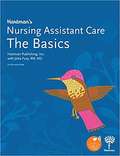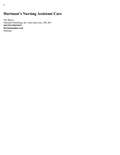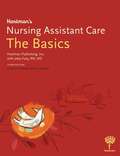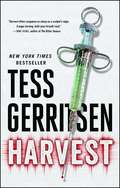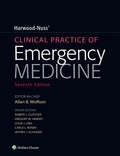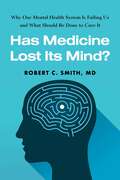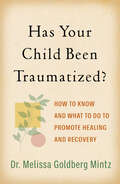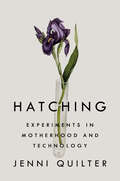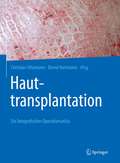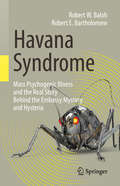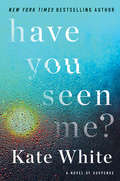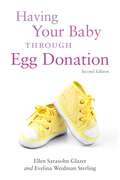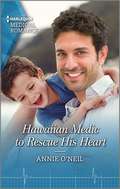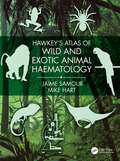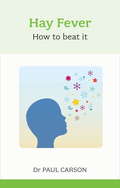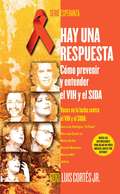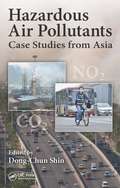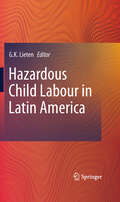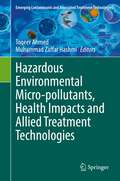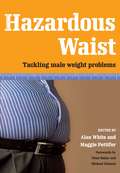- Table View
- List View
Hartman's Nursing Assistant Care: The Basics
by Hartman PublishingThe fifth edition of Hartman Publishing's briefest nursing assistant training textbook just 10 chapters contains essential information for working in long-term care. Information is explained in everyday language, with a focus on helping students pass the certification exam. Many new full-color photographs and illustrations reinforce the content. This textbook contains the following: Material organized by body system this includes each system's structure and function, normal changes of aging, how the nursing assistant can help with normal aging changes, observing and reporting, and common diseases and care guidelines Issues relating to Residents' Rights and person-centered care emphasized throughout in special boxes Up-to-date, comprehensive material about infection prevention New information about electronic documentation More information regarding mental health disorders Updated information about hypertension and new material about obtaining an electronic blood pressure reading New icon to indicate the skills that have a corresponding video Comprehensive nutrition information, including MyPlate material, updated special diets section, and feeding techniques Current information about legal issues, such as HIPAA and advance directives Many new website resources throughout and a comprehensive community resources box Significant testing section for instructors, including 10 chapters exams, two final exams, and a critical thinking exam, along with a practice exam for students taking the certification test A table of procedures, common abbreviations list, and a glossary
Hartman's Nursing Assistant Care: The Basics
by Hartman PublishingThe sixth edition of Hartman Publishing's briefest nursing assistant training textbook―just 10 chapters―contains essential information for working in long-term care. Information is explained in everyday language, with a focus on helping students pass the certification exam. Many new full-color photographs and illustrations reinforce the content.
Hartman's Nursing Assistant Care: The Basics (3rd edition)
by Hartman PublishingWelcome to the world of health care. Health care happens in many places. Nursing assistants work in many of these settings. In each setting similar tasks will be performed. However, each setting is also unique. This textbook will focus on long-term care
Harvest
by Tess GerritsenIn this classic medical thriller filled with harrowing suspense and brilliantly crafted plot twists, Tess Gerritsen—the author of the acclaimed Rizzoli & Isles series that inspired the hit television show—delivers a pulse-pounding tale that &“will make your heart skip a beat&” (USA TODAY).For Dr. Abby DiMatteo, the long road to Boston&’s Bayside Hospital has been anything but easy. Now, immersed in the grinding fatigue of her second year as a surgical resident, she&’s elated when the hospital&’s elite cardiac transplant team taps her as a potential recruit. But Abby soon makes an anguished, crucial decision that jeopardizes her entire career. A car crash victim&’s healthy heart is ready to be harvested; it is immediately cross-matched to a wealthy private patient, Nina Voss. Abby hatches a bold plan to make sure that the transplant goes instead to a dying seventeen-year-old boy who is also a perfect match. The repercussions are powerful and swift and Abby is shaken but unrepentant—until she meets the frail, tormented Nina. Then a new heart for Nina Voss suddenly appears, her transplant is completed, and Abby makes a terrible discovery: Nina&’s heart has not come through the proper channels. Defying Bayside Hospital&’s demands for silence, Abby plunges into an investigation that reveals an intricate, and murderous, chain of deceptions. Every move Abby makes spawns a vicious backlash and, in a ship anchored in the stagnant waters of Boston Harbor, a final, grisly discovery lies waiting…
Harwood-Nuss' Clinical Practice of Emergency Medicine
by Allan B. Wolfson Robert L. Cloutier Gregory W. Hendey Louis J. LingClinically focused and evidence-based, Harwood-Nuss’ Clinical Practice of Emergency Medicine, Seventh Edition, is a comprehensive, easy-to-use reference for practitioners and residents in today’s Emergency Department (ED). Templated chapters rapidly guide you to up to date information on clinical presentation, differential diagnosis, evaluation, management, and disposition, including highlighted critical interventions and common pitfalls. This concise text covers the full range of conditions you’re likely to see in the ED, with unmatched readability for quick study and reference.
Has Medicine Lost Its Mind?: Why Our Mental Health System Is Failing Us and What Should Be Done to Cure It
by Robert C. SmithOne in four Americans suffer from mental illness, yet 75% receive no treatment at all - discover why our healthcare system is failing millions and learn how we can fix it. In this groundbreaking examination of America's mental health crisis, internationally recognized physician Dr. Robert C. Smith exposes the devastating gap between physical and mental health treatment. Drawing on decades of clinical experience and evidence-based research, he reveals how the historical mind-body split in medicine has created a two-tier system of care with catastrophic consequences. Key revelations include: Why medical schools fail to properly train physicians in mental health care How untreated mental illness costs society hundreds of billions in preventable healthcare expenses The hidden toll on families and communities when depression, anxiety, and substance abuse go untreated A practical roadmap for reform that puts mental health care on equal footing with physical medicine Written with both scientific rigor and compassionate insight, this urgent call to action provides policymakers, healthcare leaders, and concerned citizens with a clear path forward. Dr. Smith, recipient of the George Engel Award and Career Teaching Achievement Award, brings unparalleled expertise to this critical examination of how we can transform mental healthcare in America.
Has Your Child Been Traumatized?: How to Know and What to Do to Promote Healing and Recovery
by Melissa Goldberg MintzWhen a child has been through an upsetting or stressful event, it can feel overwhelming. Is my child traumatized? Are new behaviors normal, or signs of PTSD? What can I do to make my child feel safe again? In this wise and authoritative guide, psychologist Melissa Goldberg Mintz assures loving parents that the tools necessary for supporting a traumatized child are ones they already possess, from promoting recovery at home, to knowing when professional help is needed. Dr. Goldberg Mintz shares specific, critical information and insights into what trauma looks like at different ages, why some kids exposed to the same event react very differently, how to help a child through trauma triggers, and more. Most important, she shows parents how to ensure that kids don&’t feel constrained by fear--and can face future challenges with hope and resilience.
Hash Cakes: Space cakes, pot brownies and other tasty cannabis creations
by Dane NoonGive yourself the munchies (in every sense) with this ultimate guide to snacks for stoners. Packed with truly delicious recipes for easy-to-make cannabis creations, this is a fun, easy way to whip up a truly relaxing snack or those perfect house-party hash cakes. Cooking with cannabis is the easiest way to enjoy the herb without the hassle of all that paraphernalia and the health risks of smoking. Studies have shown that tar from joints can contain up to 50% more carcinogens and carbon monoxide than regular cigarettes, making this the perfect gift for anyone who wants to avoid the respiratory problems and stigma of smoking, or plain can't roll a spliff. Plus, with a section on the different forms that cannabis comes in, and how you can adapt your recipes to suit them, you can be sure to never overdo the dope. This no-nonsense, no-fuss cookbook ensures that even a half-baked chef can turn out perfect results every time.
Hatching: Experiments in Motherhood and Technology
by Jenni QuilterA provocative examination of reproductive technologies that questions our understanding of fertility, motherhood, and the female bodySince the world&’s first test-tube baby was born in 1978, in vitro fertilization has made the unimaginable possible for millions of people, but its revolutionary potential remains unrealized. Today, fertility centers continue to reinforce conservative norms of motherhood and family, and infertility remains a deeply emotional experience many women are reluctant to discuss. In this vivid and incisive personal and cultural history, Jenni Quilter explores what it is like to be one of those women, both the site of a bold experiment and a potential mother caught between fearing and yearning. Quilter observes her own experience with the eye of a critic, recounting the pleasures and pains of objectification: how medicine mediates between women and their bodies, how marketing redefines pregnancy and early parenthood as a set of products, how we celebrate the &“natural&” and denigrate the artificial. With nuance, empathy, and a fierce intellect, Quilter asks urgent questions about what it means to desire a child and how much freedom reproductive technologies actually offer. Her writing embraces the complexities of motherhood and the humanity of IVF: the waiting rooms, the message boards, and the genetic permutations of what a thoroughly modern family might mean.
Hauterkrankungen in der Zahnmedizin, der Mund-Kiefer-Gesichtschirurgie, der Augenheilkunde und der Hals-Nasen-Ohrenheilkunde
by Esther Von Stebut Falk OchsendorfDieses Fachbuch ist ein praxistaugliches Nachschlagewerk für Dermatosen im Kopf - und Halsbereich. Wie erkenne ich ein Basalzellkarzinom und wie eine Aktinische Keratose? Welche Konsequenz hat das Vorliegen einer Dermatose für die zahnmedizinische Behandlung? Muss ich vorher etwas abklären? Kann die Behandlung ungestört verlaufen oder mit welchen Komplikationen muss ich ggf. rechnen? Zahlreiche Experten beantworten diese Fragen und geben Hinweise für die Erstlinientherapie. Die Dermatosen werden übersichtlich von der Klinik bis zur Therapie beschrieben und mit farbigen Abbildungen dargestellt. Das vorliegende Buch richtet sich an Ärztinnen und Ärzte in der Zahnmedizin, der Mund-Kiefer-Gesichtschirurgie, der Augenheilkunde und der Hals-Nasen-Ohrenheilkunde.
Hauttransplantation: Ein fotografischer Operationsatlas
by Christian Ottomann Bernd HartmannDas Buch erklärt anhand von Bilderserien detailliert alle gängigen Hauttransplantationsverfahren: · Spalt- und Vollhaut, · Meek-Technik für großflächige Verbrennungswunden · Keratinozyten-Transplantation · dermale Ersatzverfahren Darüber hinaus werden die neusten Hauttransplantationsverfahren wie Blistergrafting und SkinDot beschrieben. Pearls and Pitfalls bei der Hauttransplantation ergänzen die Thematik durch die Kapitel "Wundverband des Hauttransplantats" und "Komplikationsmanagement bei Infektion". Der Fokus gilt den einzelnen chirurgischen Techniken der verschiedenen Transplantationsmethoden, die Schritt-für-Schritt bebildert sind. Das Buch ist eine Anleitung zum Verschluss akuter und chronischer Wunden und eignet sich für alle operativen Fachgebiete.
Havana Syndrome: Mass Psychogenic Illness and the Real Story Behind the Embassy Mystery and Hysteria
by Robert E. Bartholomew Robert W. BalohIt is one of the most extraordinary cases in the history of science: the mating calls of insects were mistaken for a “sonic weapon” that led to a major diplomatic row. Since August 2017, the world media has been absorbed in the “attack” on diplomats from the American and Canadian Embassies in Cuba. While physicians treating victims have described it as a novel and perplexing condition that involves an array of complaints including brain damage, the authors present compelling evidence that mass psychogenic illness was the cause of “Havana Syndrome.” This mysterious condition that has baffled experts is explored across 11-chapters which offer insights by a prominent neurologist and an expert on psychogenic illness. A lively and enthralling read, the authors explore the history of similar scares from the 18th century belief that sounds from certain musical instruments were harmful to human health, to 19th century cases of “telephone shock,” and more contemporary panics involving people living near wind turbines that have been tied to a variety of health complaints. The authors provide dozens of examples of kindred episodes of mass hysteria throughout history, in addition to psychosomatic conditions and even the role of insects in triggering outbreaks. Havana Syndrome: Mass Psychogenic Illness and the Real Story Behind the Embassy Mystery and Hysteria is a scientific detective story and a case study in the social construction of mass psychogenic illness.
Have You Seen Me?: A Novel of Suspense
by Kate WhiteFrom New York Times bestselling author Kate White comes a gripping novel about one woman’s dangerous quest to recover lost memories someone would rather she never find. The key to her missing memories could bring relief—or unlock her worst nightmares.On a cold, rainy morning, finance journalist Ally Linden arrives soaked to the bone at her Manhattan office, only to find that she’s forgotten her keycard. When her boss shows, he’s shocked to see her—because, he explains, she hasn’t worked there in five years.Ally knows her name, but is having trouble coming up with much beyond that, though after a trip to the psychiatric ER, she begins to piece together important facts: she lives on the Upper West Side; she’s now a freelance journalist; she’s married to a terrific man named Hugh. More memories materialize and yet she still can’t recall anything about the previous two days. Diagnosed as having experienced a dissociative state, she starts to wonder if it may have been triggered by something she saw. Could she have witnessed an accident—or worse—had something happened to her? Desperate for answers, Ally tries to track where she spent the missing days, but every detail she unearths points to an explanation that’s increasingly ominous, and it’s clear someone wants to prevent her from learning where those forty-eight hours went. In order to uncover the truth, Ally must dig deep into the secrets of her past—and outsmart the person who seems determined to silence her.
Having Your Baby Through Egg Donation: Second Edition
by Ellen Sarasohn Glazer Evelina Weidman Weidman SterlingHaving Your Baby Through Egg Donation is a helpful, authoritative guide to negotiating the complex and emotive issues that arise for those considering whether or not to pursue egg donation. It presents information clearly and with compassion, exploring the practical, financial, logistical, social and ethical questions that commonly arise. This fully updated second edition also includes recent developments in the field, including travelling for egg donation and the emerging field of epigenetics.This book will be valued by all those considering or undergoing donor conception, as well as the range of professionals who support them, including infertility counsellors, psychologists, therapists and social workers.
Having Your Baby with a Nurse-Midwife: Everything You Need to Know to Make an Informed Decision
by Sandra Jacobs American College of Nurse-MidwivesStudies have shown that countries who employ nurse-midwives have an extremely low infant mortality rate. This book explores nurse-midwives and the services they provide in a variety of environments. Home births, birthing centers and having your baby in a hospital with a nurse-midwife in attendance are explored with pros and cons of each. Insurance costs, pre-existing health conditions, political and financial considerations and state-by-state licensing regulations are also explored in detail so people can make the best decision for themselves and their new babies.
Hawaiian Kiss with the Brooding Doc (Honolulu Medics)
by Scarlet WilsonIn this first installment of the Honolulu Medics duet by Scarlet Wilson, romance with the grumpy boss is strictly off-limits for Doctor Piper, but a passionate kiss in Hawaii makes her think twice… OPPOSITES ATTRACT? Living in Hawaii should be pure paradise for Dr. Piper. But while she is a ray of sunshine, her boss is proving to be a permanent rain cloud. Piper can&’t deny that Jamie is an exceptional doctor…nor blame him for being guarded when she&’s harboring a heartbreak of her own. But once Piper uncovers Jamie&’s reason for being the department&’s grouch, a surprising attraction begins to grow. Still, a relationship with him must surely stay off-limits—even after their earth-shattering kiss?From Harlequin Medical: Life and love in the world of modern medicine. Honolulu MedicsBook 1: Hawaiian Kiss with the Brooding Doc by Scarlet WilsonBook 2: The Surgeon's Tropical Temptation by Kate Hardy
Hawaiian Medic to Rescue His Heart
by Annie O'NeilCan she tempt this single dad…To take a risk in paradise?Divorced New York firefighter and paramedic Zach Murphy is looking forward to the more relaxed pace of Hawaiian life and building a brighter future for himself and his son. But his stunning new search and rescue colleague Lulu Kahale has the potential to derail his dreams of a quiet existence! Falling in love was never part of the plan, but Lulu tempts Zach to break all his own rules… &“This was my first medical romance from the Harlequin line. I was quite impressed…you can immerse in travel and happily ever after with this delightful book.&”-Harlequin Junkie on A Family Made in Rome &“This was a genuinely lovely story and it had some wonderful characters. It is 5 stars from me for this one, very highly recommended and this was a nice wholesome read!&”-Goodreads on Christmas Under the Northern Lights
Hawkey's Atlas of Wild and Exotic Animal Haematology
by Jaime Samour Mike HartThis revised, updated and expanded edition of Christine Hawkey’s A Colour Atlas of Comparative Veterinary Haematology is bursting with high-quality images to aid identification of blood cells and haemoparasites in the different species commonly seen in private practice and zoological collections. It will assist veterinarians in the identification of normal and abnormal blood cells and in understanding the structural differences of blood cells between the various taxa within the Animal Kingdom. With the help of this guide, readers will be able to understand haemoresponses in the presence of specific and non-specific disease processes and identify haemoparasites commonly seen in blood films from wild and exotic animals. This impressively illustrated comparative haematology atlas is unrivalled in its scope, quality and accuracy. It is a must-have for veterinary students, veterinary surgeons working in general and referral veterinary clinical practices, clinicians working in zoological collections and specialists in exotic animal medicine.
Hay Fever: How To Beat It
by Paul CarsonThis book looks at remedies both orthodox and less orthodox. It explains how doctors treat hay fever, and considers options other than medication, including immunotherapy. Aleergy testing is also covered. The importance of nasal douching is stressed, with step-bystep instructions. Also includes self-help tips and alternative remedies.
Hay Fever: How To Beat It
by Paul CarsonThis book looks at remedies both orthodox and less orthodox. It explains how doctors treat hay fever, and considers options other than medication, including immunotherapy. Aleergy testing is also covered. The importance of nasal douching is stressed, with step-bystep instructions. Also includes self-help tips and alternative remedies.
Hay una respuesta (There Is an Answer)
by Luis CortesEl VIH y el SIDA son temas que asustan. No sólo pueden destruir un cuerpo, sino que también pueden destruir una familia, las amistades y hasta una comunidad. A nadie le gusta hablar de eso, pero ignorar el problema no hará que éste desaparezca. La única manera en que podremos superar esta enfermedad es a través de la educación, la precaución y el tratamiento adecuado, ya que nadie es inmune. En Hay una respuesta, el reverendo Luis Cortés Jr. te enseña a entender este virus. La prevención es el mejor método, pero contraer VIH ya no es una sentencia de muerte. Ahora hay una serie de tratamientos disponibles y las personas que se han contagiado pueden vivir con la enfermedad. Si tú tienes VIH o SIDA, conoces a alguien que lo tenga o si tan sólo quieres educarte acerca de este tema, recuerda lo siguiente: Hay una respuesta.
Hazardous Air Pollutants: Case Studies from Asia
by Dong-Chun ShinHazardous Air Pollutants: Case Studies from Asia examines the variety of public health problems, such as cardiovascular disease, respiratory disease, increased mortality, and impaired mental health, that are severely affecting multiple Asian countries as a result of exposure to high concentrations of air pollution in the wake of rapid industrializa
Hazardous Child Labour in Latin America
by G. K. LietenIn order to bridge the lack of information on child labour and to stimulate policy interventions the IREWOC Foundation (International Research on Working Children) has undertaken action-based research in the field of the worst forms of child labour in Latin America. In 2006 and 2007 a comparative study on the Worst Forms of Child Labour was carried out in 7 different economic sectors in Bolivia, Guatemala and Peru focussing on the hazardous worst forms. The central research objectives were as follows: * to map the working and living situations of children who are working in specific economic sectors and what the consequences of this work are for their physical and emotional wellbeing. * to investigate the reasons why these children are working in these worst forms sectors. The research results were expected to give important insights into the currently polarised debate between those who state child labour is above all related to cultural considerations and those who state that economic reasons are fundamental to the phenomena of child labour. * to map the existing policy initiatives for child labourers in the worst forms and to identify the best practices. In the face of challenges imposed by achieving the Millennium Development Goals (MDGs) set by the UN, specific attention was paid to educational initiatives. Is education a useful tool in combating child labour, and vice versa, is child labour a significant obstacle to achieving universal primary education? Although the evidence from the various cases discussed in the book illustrate positive trends in terms of the worst forms of child labor, thousands of children were still found to be engaged in activities that form a direct threat to their physical, mental and moral health and jeopardize their education. This book proposes several practical recommendations for possible interventions.
Hazardous Environmental Micro-pollutants, Health Impacts and Allied Treatment Technologies (Emerging Contaminants and Associated Treatment Technologies)
by Muhammad Zaffar Hashmi Toqeer AhmedThis volume discusses hazardous environmental micropollutants, their impacts on human health, and possible means to mitigate their associated risks. The book features chapters that cover a variety of topics related to environmental micropollutants, which include dusts, infectious particles, heavy metals, organophosphates, atmospheric toxic organic micropollutants, fungal spores, pollutants from E-waste, antibiotic waste, and more. In addition impacts on human health and the environment, economic issues are addressed, with potential policy solutions offered. This work is timely, as hazardous micropollutants in soil, water and air are becoming more common, and this environmental contamination is leading to increasing instances of suboptimal human health outcomes. The book will be of interest to students and researchers in environmental pollution and remediation technology, microbiologists, and environmental regulators.
Hazardous Waist: Tackling Male Weight Problems (Radcliffe Ser.)
by Alan White Maggie PettiferThis book includes a foreword by Peter Baker, Chief Executive, The Men's Health Forum. Male weight problems are a serious public health issue and can lead to hypertension, hyperlipidaemia, diabetes and cancer. If current trends continue, the prospect of the majority of men becoming overweight is a very real one, and urgent action is imperative. The middle-aged spread that most men 'expect' to develop as they enter into their thirties and forties is now occurring much earlier with boys and young men developing life limiting weight problems. This multidisciplinary guide provides a gender sensitive approach to weight issues. Men need to be targeted specifically and in a male-focused manner, in order to overcome the multitude of contributing factors in their weight gain; social influences, dietary restrictions, education, cultural expectations, psychological considerations and exercise regime. This book takes a balanced approach, offering practical guidance as well as evidence-based research, academic perspectives and personal experiences. The advice is easy to implement and has been proven in real-life settings. All healthcare professionals, nutritionists and dieticians will find the assistance invaluable. It is also highly recommended for psychologists, counsellors and therapists, particularly those working with men. Healthcare policy makers and shapers too, will find much of interest. 'A definitive and seminal book that will change the way male weight problems are tackled in the UK and beyond.' - Peter Baker, in the Foreword.
